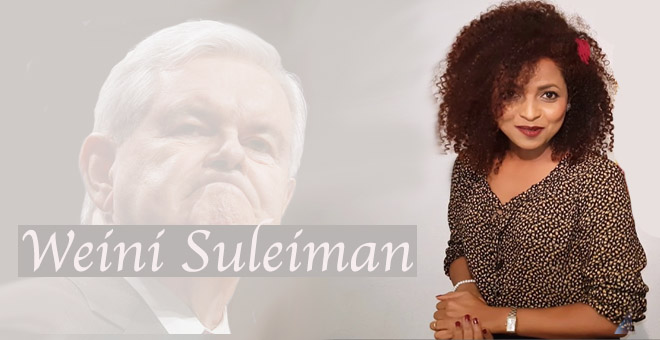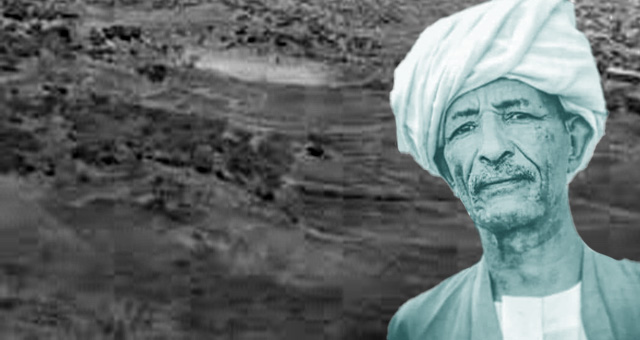Eritrea’s Socio-Politics of Slash and Burn

Back in 1990, The New York Times had an opinion piece titled, “The Politics of Slash and Burn”. The gist of the article speaks to the beginning of down spiraling political discourse in the US where Republican candidates were encouraged to use words like ”Sick.” ”Traitors.” ”Bizarre.” ”Self-serving.” ”Shallow.” ”Corrupt.” ”Pathetic.” ”Shame” when describing their opponents. The architect was no other than Newt Gingrich who was the Republican’s Grand Old Party (GOP) chairman at the time. The tenet of his message was to “step up [the] invective.”
The opinion piece traces the politics of slash and burn to the 1988 presidential campaign that “Mr. Gingrich’s injunction represents the worst of American political discourse, which reached a low during the dispiriting Presidential campaign [where] negative argument displaced reasoned discussion about how a nation might best be governed. The sound bite reigned. Attack commercials flourished…Negative discourse serves democracy poorly. The temptation to avoid serious debate is already great. It increases as the stakes soar and slander becomes a rewarding easy option…There must be limits to the negative politics that voters will bear; the bald appeal to invective will certainly probe those limits.” NY Times.
Thirty years later, the culmination of this sort of political discourse was on display for the world to see in the mockery that the US political discourse has descended as the first debate between Trump and Biden on the 29th of September 2020 was an attestation. With this background in mind enter Eritrea’s socio-political discourse.
The social media is abuzz with Eritrean individuals colonizing its space dominating the narrative of slash and burn. Attempting to keep track of the deluge will be an exercise in futility as it would be more than a fulltime job to thoroughly address it. There appears to be no rhyme or reason to the many messages that one can hear when these hosts offer their daily dosage of venom. Majority of their time is spent belittling other Eritreans who are in their camp fighting the regime in Eritrea. Somewhere down the line, in the process of our attempt to fight against the menace in the homeland, our objective of fighting appears to have been lost and we are fighting one another instead. Who is doing this is not as important as why we are doing it to ourselves.
Akin to the GOP’s approach, one thing that continues to remain constant in Eritrea’s political discourse is the legacy of EPLF-turned-PFDJ approach to the propaganda machination that churns and hurls its insults incessantly when it sees individuals challenging its authority. Today, hurling epithets with those whose ideas we disagree with has become the norm. The self-appointed social media hosts abound, there are some that stand out because they use words that one can’t even say in private let alone in public. It has descended so low it is not nauseating but crushing to the spirit and soul of Eritrea’s heritage. Ironically, these self-appointed hosts speak glowingly about Eritrean tradition, cultural heritage, history as the common refrain can be summed up by the Tirginya term ክብርታትና that they are fond of using as though what they are spewing daily isn’t an antithesis to the very values they claim to hold gloriously.
Back in July of 2007 two part articles I had written speaks to “[t]he slash and burn, the political savagery, the character assassinations of individuals who stray out of the political norm, that norm as dictated by the EPLF in the past and PFDJ of today, continues undiminished. Mengisteab Yisaq and …Petros Yohannes were just that: the political black sheep of that era as much as G-15 members and thousands of others are of today’s Eritrea.”
Enter Jstudio’s Yellow Journalism
The culmination of such innuendos, red herring and ad hominem attacks has monumentally increased in intensity. The sociopolitical discourse in Eritrean context today appears to follow what was framed by the EPLF/PFDJ for those in opposition and supporters alike. The most notorious one in this that illustrates the use of yellow journalism is Jstudio. The narration is compelling as it tries to make it appear that it uses rigor when all it does is use hearsay to attack not the actions of individuals it is targeting but family members, relatives, next of kin are a fair game for the relentless and evidence-less dispatch. Never do they cite their source. They simply say they have documents. The problem with this kind of yellow journalism is that the more one watches it the more monetarily these entities are rewarded for it and the more outrageous their show-and-tell becomes. One can find out how much money these types of shows are drawing by going to this link.
The vitriol in this particular case is beyond compare. Much as the American political discourse has reached its feverish pitch today with the man in the White House leading the pack where there is no limit to his unhinges. Similarly, Jstudio’s show goes on a monologue binge consistently and insistently, it uses colorful language to defame individuals with such callousness that it is hard to believe the show has followers. But such is the level of deterioration Eritrean social media has reached.
Enter Weini Suleiman’s Interview Style
Hope, however, is not lost when one comes across Eritrean professional journalists who elevate the discourse because of their ability to draw the best out of the people they interview. One such individual is worth mentioning for illustration. When Saleh “Gadi” Johar was awarded Eritrea’s PEN* this year, he was interviewed by Weini Suleiman. What a marvelous interview! I have watched this young woman previously interviewing others. One that stands out is an interview she did with an artist, Fitsum Beraki**, about three years ago. In fact, memory has served me right, I unearthed some of the comments I made about this magnetic journalist. “Weini is proving to be, in my estimate, our Eritrean Terry Gross, whom I try to listen to on NPR’s Fresh Air whenever time permits it. Weini is a gripping interviewer.
She has this knack for letting people open up to her…this was one of those rare moments when I found myself watching a lifetime tribute being paid to the legend Smokey Robinson by the Library of Congress Gershwin Prize***, the highest honor any artist can be bestowed upon. I didn’t realize how much of my music consumption was informed by Smokey’s music of the eighties when my Eritrean American identity was being formed in the U.S. and he was part of that evolution. I knew almost every song of Smokey Robinson, which was sung by various artists during last night’s gala. I was awestruck by the amount of energy, time, and effort that was put in place to appreciate the work of art of one individual in a nation. Our soul has been robbed in Eritrea because there is no yearly artistic endeavor, we can make a journey towards that is worth its salt.
The binge watching was meant to continue unabated, which brought me to this young Eritrean woman who appears to hail from Germany. I tried to watch the first clip where Weini Suleiman interviews this Eritrean artist. The interview with Maebel (I didn’t finish) and went on to a second one (no guest, she simply challenges her viewers about their patriarchal assumptions that forces them to insult whenever Eritrean females are in any public forums). I would’ve had a ton of things to share with the host on this, but it was one month too late – the show aired about a month ago.
“As a viewer I can see the host was trying her level best to get him to open up, one can see Fitsum is resisting it through his demeanor, the way he was being fidgety, the way he was sitting, the way his fingers were making nervous movements, all riveted me. As it turned out Fitsum Beraki** knew a lot of the Eritreans who perished in the Lampedusa tragedy. He slowly opens up, but you can see the pain on his face, in his demeanor, and in his voice. He talks about how art is suffering among Diaspora Eritreans where there is no concerted effort being made to organize the artists into some tent where they can share their artwork.”
One crucial area that requires concerted effort is to have a space where artists can collaborate and become part and parcel of that whole movement in the opposition. We all know the crucial role music played in the struggle for independence. The deprivation of art in Eritrean context has a negative impact on our spirit and soul – And music is part of what sustains it. And we are getting very little of it.
*Weini Suleiman interview with Saleh G. Johar
**Weini Suleiman interview with Fitsum Beraki
***Link to Smokey Robinson’s Tribute
Related Reading:
1- Tribute to A Fallen Hero that No One Wishes to Remember
2- EFLNA/ENASA(Mengisteab Yisaq, Petros Yohannes) & EPLF


Awate Forum